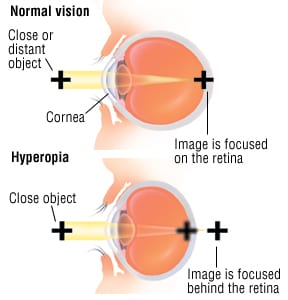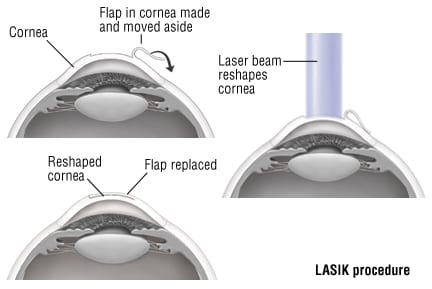Patient Basics: Farsightedness (Hyperopia)
Originally published by Harvard Health.
What Is It?
A person with farsightedness, also called hyperopia, has difficulty seeing objects close to the eye. They can see distant objects well.
In most cases, farsightedness is an inherited condition caused by an eye that is too short front to back. This reduces the distance between the cornea (the clear film that covers the front of the eye) and the retina (the light sensitive layer at the back of the eye). Because this distance is shorter, images tend to focus behind the retina, rather than on the retina. Usually, the eye is able to compensate, partially or totally, for this focusing problem through a process called accommodation. This is especially true in younger people. In accommodation, tiny muscles within the eye contract, altering the shape of the lens and bringing the viewed object into focus.
Symptoms
Symptoms of a farsightedness can include:
- Difficulty seeing objects fairly close to the eye – You may notice that your vision blurs when you try to read a book, thread a needle or assemble small pieces of a model.
- Headaches – These may be related to overworked eye muscles that are struggling to bring objects into focus.
- Crossed eyes in children – Severely farsighted children can appear cross-eyed (both eyes turn inward toward the nose) because of extreme efforts to focus. This condition, called accommodative esotropia, usually develops in early childhood. It can be constant or show up from time to time.
During childhood and adolescence, many people who have inherited short eyes do not show symptoms of farsightedness because their youthful eyes are so good at accommodating. With time, however, age-related changes in the lens can make the process of accommodation less effective, and symptoms of farsightedness eventually appear.
Diagnosis
After reviewing your symptoms, your doctor will examine your eyes, and will test how well you can see.
Expected Duration
Farsightedness is usually a lifelong condition, although symptoms may not be noticeable during childhood.
Prevention
Most farsightedness is inherited and cannot be prevented.
Treatment
If you are farsighted, your doctor probably will prescribe eyeglasses or contact lenses to correct your problem. The lenses used in both of these treatments are thick in the center and thinner around the edge, which brings the viewed image forward into proper focus on the retina.
Some cases of farsightedness also can be corrected with laser eye surgery, such as LASIK (laser in situ keratomileusis). Although the U.S. Food and Drug Administration (FDA) has approved several types of lasers for surgical treatment of farsightedness, not every farsighted person is a good candidate for this type of treatment. For updates on the benefits and risks of laser eye surgery and for a list of FDA-approved lasers, contact the FDA.
When To Call a Professional
Make an appointment to see your primary care doctor or ophthalmologist (a doctor who specializes in eye problems) if your vision blurs when you try to read or find it difficult to see when you do close work, such as sewing, repairing delicate machinery or building models.
If you are a parent, call your pediatrician if your child holds books very close to his or her face while reading, complains of frequent headaches or appears cross-eyed.
Infants are normally very farsighted at birth, but this condition almost always corrects itself between ages 3 months and 2 years. However, make sure that your doctor checks your child’s eyes as a part of every well-baby visit. Your child also should have visual testing at about age 3 and a half, and again at the start of school.
Prognosis
If you use eyeglasses or contact lenses to correct your problem, the outlook is good.
The long-term effects of laser eye surgery, however, are still being evaluated. Many people report satisfaction with the results of laser eye surgery, and tens of thousands of procedures are performed successfully each year in the United States. However, as in other forms of surgery, you should understand the risks and benefits of laser eye surgery before you decide whether to have the procedure done.
Additional Info
National Eye Institute
2020 Vision Place
Bethesda, MD 20892-3655
Phone: 301-496-5248
http://www.nei.nih.gov/
American Academy of Ophthalmology
P.O. Box 7424
San Francisco, CA 94120-7424
Phone: 415-561-8500
Fax: 415-561-8533
http://www.aao.org
American Academy of Pediatrics (AAP)
141 Northwest Point Blvd.
Elk Grove Village, IL 60007-1098
Phone: 847-434-4000
Fax: 847-434-8000
http://www.aap.org/
American Society of Cataract and Refractive Surgery/American Society of Ophthalmic Administrators
4000 Legato Road
Suite 850
Fairfax, Virginia 22033
Phone: 703-591-2220
Toll-Free: 1-888-949-6753
Fax: 703-591-0614
http://www.ascrs.org/
U.S. Food and Drug Administration (FDA)
5600 Fishers Lane
Rockville, MD 20857
Toll-Free: 1-888-463-6332
http://www.fda.gov/


